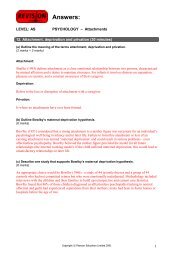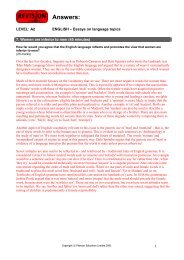Answers - Pearson
Answers - Pearson
Answers - Pearson
- No tags were found...
Create successful ePaper yourself
Turn your PDF publications into a flip-book with our unique Google optimized e-Paper software.
<strong>Answers</strong>:LEVEL: A2ENGLISH – Essays on language topics8. Accents (45 minutes)In what ways, and for what reasons, might people make judgements about others on the basis of theiraccents?(25 marks)Research has consistently shown that people tend to make assumptions about others on the basis of their accents.An accent tends to suggest to listeners that the speaker belongs to a particular social group, and we often havestereotyped images of the members of these groups. Research has focused on the ways different regional accentsare perceived, and also on reactions to Received Pronunciation (RP), the accent associated with upper classspeakers of the language.Researchers have found that RP speakers tend to be rated more highly than speakers with a regional accent interms of their general competence: others tend to give them high ratings for such qualities as 'intelligence', 'selfconfidence','ambition', 'determination' and 'industriousness'. However, they emerge less favourably thanspeakers with a regional accent in terms of personal qualities and general social attractiveness: they score lesswell for qualities such as 'friendliness', 'warmth', 'talkativeness', 'good-naturedness' and 'sense of humour'.Among regional accents, those with rural associations (e.g. West Country accents) are often viewed mostpositively. The Southern Irish accent also tends to gain a positive reaction, and is often praised for having'charm' and sounding 'soft' and 'warm' (it is noticeable how many Irish voices are heard in broadcasting). Lesspopular are accents with urban associations, such as Cockney and Liverpudlian. In particular, researchers haveoften found that the Birmingham accent is the least liked.An example of research supporting the above findings is the work of Howard Giles. In one experiment Gilespresented five groups of students with an identical set of arguments against capital punishment. One group reada printed text, the other four groups heard an oral presentation. The four oral presentations were given byspeakers with different accents. One group heard an RP speaker, another a Somerset speaker, another a SouthWelsh speaker and the last group a Birmingham speaker. The students were first asked about how impressedthey were by the competence of the presentations. Those who had read the printed text and those who had heardthe RP speaker were the most impressed. Least impressed were those who had heard the Birmingham speaker.Giles then assessed the persuasiveness of the accents by comparing the students' views on capital punishmentbefore and after the presentations. Here he found that regional accents scored most highly: those hearingregional speakers were more likely to have changed their minds than those hearing the RP speaker or reading theprinted texts.Another research exercise conducted by the Worcester College of Higher Education suggested that speakers witha Birmingham accent may be more likely to be presumed guilty when suspected of a criminal offence. Theresearch team hired male actors to reproduce police interviews with suspected armed robbers and chequefraudsters. The actors used the Birmingham accent together with other accents and the resulting tapes wereplayed to a large group of students. The suspect with a Birmingham accent was more likely to be consideredguilty and was also regarded as less intelligent, less socially competent and more likely to be poor and workingclass.A variety of possible explanations can be offered for the prejudices people have towards particular accents. TheRP accent is associated with status and power (the royal family are RP speakers, for example), so it is notsurprising that it is associated with authority and competence. However, because most people do not belong tothis class themselves and feel socially distanced from it, they do not see it as conveying friendliness and warmth.People also make connections between accents and the regions from which they derive. Most people have apositive view of the countryside (associating it with beauty and tranquillity), so they respond favourably to ruralaccents. Correspondingly, urban areas have more negative associations (such as traffic, pollution and crime) sourban accents are not viewed as favourably.Copyright © <strong>Pearson</strong> Education Limited 2001 1
<strong>Answers</strong>:LEVEL: A2ENGLISH – Essays on language topicsFinally, the stereotypes associated with particular accents are often reinforced and perpetuated by the media. Forexample, the stereotype of the Cockney wideboy was reinforced by 'Only Fools and Horses'. The Sun's portrayalof Liverpool fans after the Hillsborough disaster perpetuated negative images of Liverpudlians. The RP accent iscommonly heard on news broadcasts, emphasising its association with authority.(Total marks 25)Copyright © <strong>Pearson</strong> Education Limited 2001 2
















